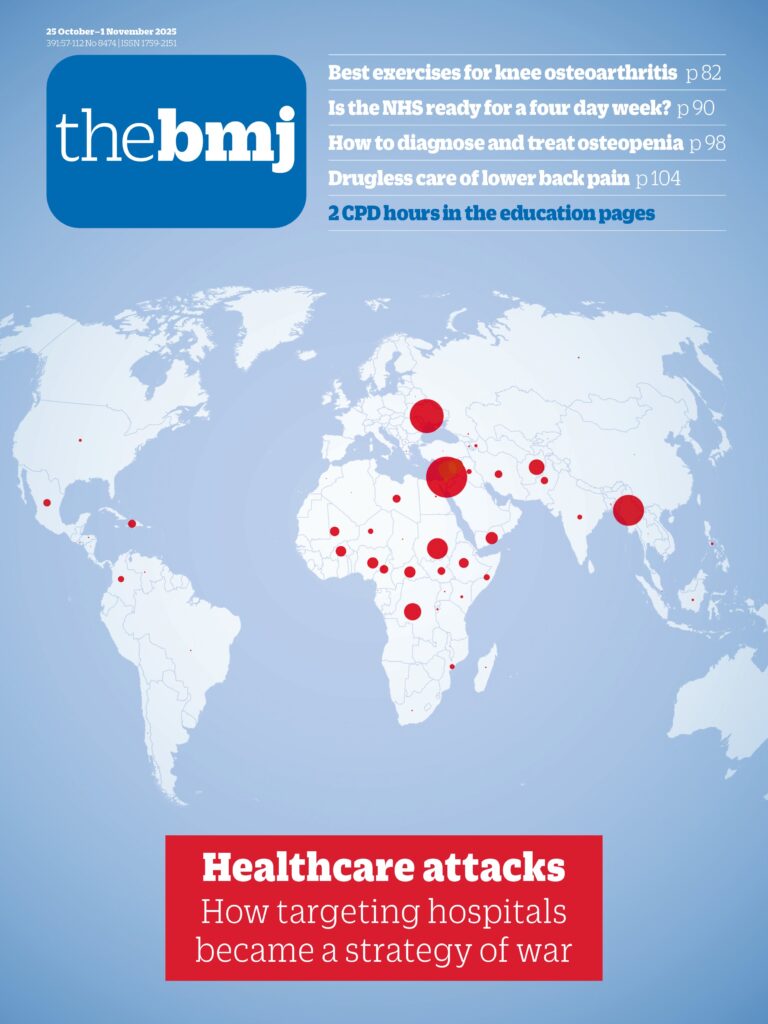Since conflict erupted in April 2023, Sudan has witnessed one of the largest internal displacement crises in the world, with nearly 13 million people forced from their homes.1 As the public health infrastructure crumbles, volunteer doctors, many of whom are displaced themselves, are keeping Sudan’s fragmented health system afloat. These doctors are a lifeline for people besieged and displaced by the war.23 Sudan’s volunteer doctors require support from the international community—their critical efforts cannot be sustained without a strong, coordinated response to the ongoing health and humanitarian crisis.
More than two thirds of Sudan’s medical facilities are not functioning because of attacks or a shortage of staff and resources.4 Some hospitals have been occupied by armed groups, while others have been forced to close because of a lack of security, water, or electricity. Insecurity due to the ongoing hostilities, fuel shortages, and roadblocks has led to the collapse of medical supply chains.56
Amid this chaos, thousands of doctors across Sudan volunteered to step in. They work in poor conditions: their clinics are makeshift tents, the ruins of hospital facilities, or in the open air, without necessities such as electricity and water. Essential medicines are in short supply, including anaesthesia and intravenous fluids. Gauze and gloves are considered luxuries. The doctors’ decision to care for patients during this conflict comes at great personal risk. Healthcare workers in Sudan have been killed during attacks on hospitals or in road ambushes while transporting patients. These volunteers are the glue holding the fractured healthcare system together.78
As Sudan’s humanitarian crisis continues to unfold, displacement camps face an overwhelming burden of disease. Malaria cases surge during the rainy season, often complicated by drug resistance and malnutrition. Cholera, typhoid, tuberculosis, and diarrhoeal diseases are rampant in overcrowded camps with inadequate sanitation. Measles outbreaks rage among children whose vaccination schedules were interrupted.9 Mental health disorders and post-traumatic stress are widespread but largely undiagnosed and untreated.8 Pregnant women deliver in unsafe conditions with no trained midwives or sterile equipment.38
Doctors work with minimal oversight or support. Conflict zones are inaccessible. Humanitarian convoys are often blocked or looted.6 Telecommunications blackouts disrupt coordination between facilities.3 Within these constraints, they are unable to document the conditions they are working in to spread awareness or raise funding, effectively cutting them off from much needed global support.
Although the outlook is grim, there is a path forward. The remarkable grassroots response by doctors in Sudan deserves recognition and action. The international health and humanitarian community, governments, donors, non-governmental organisations, and the Sudanese diaspora can raise the visibility of Sudan’s crisis through coordinated media and advocacy efforts. Sudan must be prioritised on international agendas to ensure political commitment to end the conflict, secure humanitarian access, and document the damaging impact of the war. Enhancing protection for health facilities under international humanitarian law is a key step to preserving what remains of the fragile health system.10
With the resurgence of communicable diseases in Sudan, volunteers could benefit from access to offline data tools and training in tracking diseases. The World Health Organization has deployed its early warning alert and response system (EWARS) in Sudan,11 but implementation is fragmented and does not cover the scope of the crisis. The international community, led by WHO, must now act to increase coverage.
Donors and philanthropic organisations can enable support for Sudan’s healthcare system by offering flexible, rapid funding while reducing barriers such as rigid eligibility criteria, lengthy approval processes, and complicated reporting requirements. Amid growing donor fatigue,8 allocated funds must translate to tangible effects on the ground. The Sudanese diaspora and local communities have a key role in highlighting what interventions are working and what gaps remain.
Donor strategies must diversify to include essential equipment and technical support. When funds cannot be accessed or disbursed, humanitarian and other non-governmental organisations can prioritise donations of essential medicines and equipment. In conflict zones, emerging technologies such as satellite wi-fi are a necessity.
Overall, the international response remains fragmented and inadequate. Donors and international organisations must work hand in hand with those on the frontlines. In a country largely deprived of international attention, Sudan’s volunteer doctors are the only functioning part of a shattered health system in many areas amid a relentless war. Against all the odds, they are persevering, driven by resilience, compassion, and necessity.2912 These people are unpaid lifelines in a nation at war with itself. In telling their story, we bear witness to their extraordinary endurance and quiet heroism.
Footnotes
-
Competing interests: None.
-
Provenance and peer review: Not commissioned, not externally peer reviewed.
-
AI use: Grammarly was used to correct grammar, rephrase text, adjust tone, and enhance the clarity of the text.

